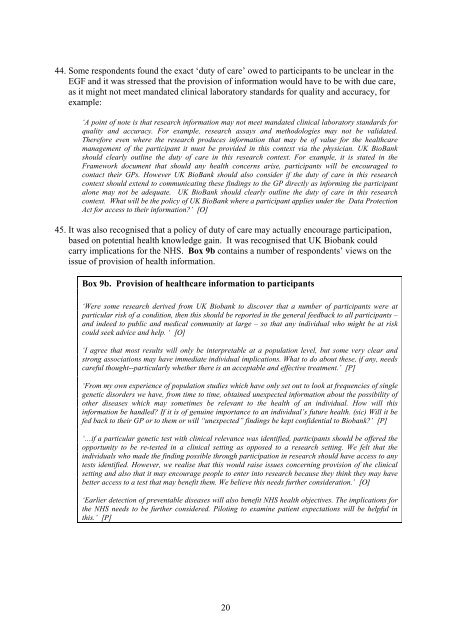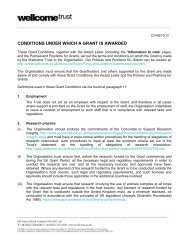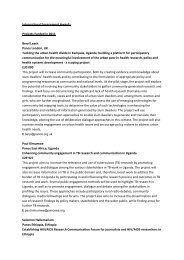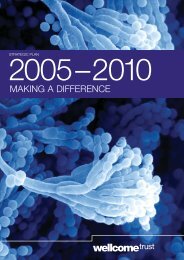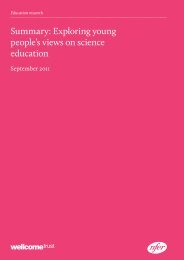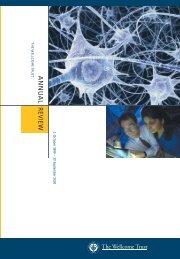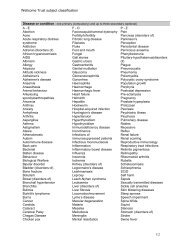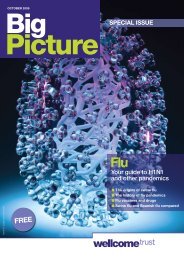UK BIOBANK Ethics and Governance Framework ... - Wellcome Trust
UK BIOBANK Ethics and Governance Framework ... - Wellcome Trust
UK BIOBANK Ethics and Governance Framework ... - Wellcome Trust
You also want an ePaper? Increase the reach of your titles
YUMPU automatically turns print PDFs into web optimized ePapers that Google loves.
44. Some respondents found the exact ‘duty of care’ owed to participants to be unclear in theEGF <strong>and</strong> it was stressed that the provision of information would have to be with due care,as it might not meet m<strong>and</strong>ated clinical laboratory st<strong>and</strong>ards for quality <strong>and</strong> accuracy, forexample:‘A point of note is that research information may not meet m<strong>and</strong>ated clinical laboratory st<strong>and</strong>ards forquality <strong>and</strong> accuracy. For example, research assays <strong>and</strong> methodologies may not be validated.Therefore even where the research produces information that may be of value for the healthcaremanagement of the participant it must be provided in this context via the physician. <strong>UK</strong> BioBankshould clearly outline the duty of care in this research context. For example, it is stated in the<strong>Framework</strong> document that should any health concerns arise, participants will be encouraged tocontact their GPs. However <strong>UK</strong> BioBank should also consider if the duty of care in this researchcontext should extend to communicating these findings to the GP directly as informing the participantalone may not be adequate. <strong>UK</strong> BioBank should clearly outline the duty of care in this researchcontext. What will be the policy of <strong>UK</strong> BioBank where a participant applies under the Data ProtectionAct for access to their information?’ [O]45. It was also recognised that a policy of duty of care may actually encourage participation,based on potential health knowledge gain. It was recognised that <strong>UK</strong> Biobank couldcarry implications for the NHS. Box 9b contains a number of respondents’ views on theissue of provision of health information.Box 9b. Provision of healthcare information to participants‘Were some research derived from <strong>UK</strong> Biobank to discover that a number of participants were atparticular risk of a condition, then this should be reported in the general feedback to all participants –<strong>and</strong> indeed to public <strong>and</strong> medical community at large – so that any individual who might be at riskcould seek advice <strong>and</strong> help. ‘ [O]‘I agree that most results will only be interpretable at a population level, but some very clear <strong>and</strong>strong associations may have immediate individual implications. What to do about these, if any, needscareful thought--particularly whether there is an acceptable <strong>and</strong> effective treatment.’ [P]‘From my own experience of population studies which have only set out to look at frequencies of singlegenetic disorders we have, from time to time, obtained unexpected information about the possibility ofother diseases which may sometimes be relevant to the health of an individual. How will thisinformation be h<strong>and</strong>led? If it is of genuine importance to an individual’s future health. (sic) Will it befed back to their GP or to them or will “unexpected” findings be kept confidential to Biobank?’ [P]‘…if a particular genetic test with clinical relevance was identified, participants should be offered theopportunity to be re-tested in a clinical setting as opposed to a research setting. We felt that theindividuals who made the finding possible through participation in research should have access to anytests identified. However, we realise that this would raise issues concerning provision of the clinicalsetting <strong>and</strong> also that it may encourage people to enter into research because they think they may havebetter access to a test that may benefit them. We believe this needs further consideration.’ [O]‘Earlier detection of preventable diseases will also benefit NHS health objectives. The implications forthe NHS needs to be further considered. Piloting to examine patient expectations will be helpful inthis.’ [P]20


